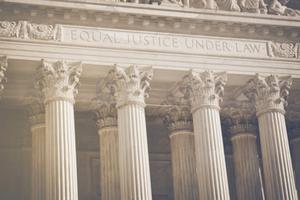Supreme Court Overturns ‘Chevron’ Doctrine With Big Implications for Religious Freedom
In its Friday decision, the Supreme Court ordered that courts ‘may not defer to an agency interpretation of the law’ merely because a law’s intent is unclear.

The Supreme Court on Friday overturned a 40-year-old decision that gave unelected federal agencies considerable power to interpret federal law, with significant implications for religious freedom.
The high court in its Friday decision in the case Loper Bright Enterprises v. Raimondo overturned the 1984 ruling in Chevron v. National Resources Defense Council, which held that courts were generally required to defer to federal agencies in interpreting federal law, a rule known as “Chevron deference” or the Chevron doctrine.
The Loper case challenged federal rules applied to the fishing industry. In its Friday decision, the Supreme Court ordered that courts “may not defer to an agency interpretation of the law” merely because a law’s intent is unclear.
The decision returns the authority to interpret law to the courts, the ruling said; courts must now “exercise their independent judgment in deciding whether an agency has acted within its statutory authority” rather than using Chevron to defer their judgment.
In a concurring opinion, Justice Clarence Thomas said the Chevron doctrine was “a fundamental disruption of our separation of powers,” one that “improperly [stripped] courts of judicial power by simultaneously increasing the power of executive agencies.”
‘Courts Will Now Have the Final Say’
The Chevron doctrine has considerable implications for religious freedom, experts told CNA on Friday.
Philip Hamburger, a constitutional law professor at Columbia Law School, said the decision was “a notable day for freedom in the United States.”
“In taking a dent out of the administrative state, today’s decision will help protect religious Americans,” Hamburger said.
“Administrative bureaucrats, especially administrative experts, are not representative of the United States and on average are intolerant of religion, especially relatively orthodox opinions.”
“Administrative power, in other words, is slanted against traditional Catholics, Protestants, Jews, and others who adhere to their inherited faiths,” Hamburger said. “We therefore should celebrate decisions such as this one that limits administrative power to what is authorized by Congress.”
Hamburger added that he would be “opening a bottle of champagne” in celebration of the decision.
The Loper case drew support from Catholic plaintiffs: The Little Sisters of the Poor had filed an amicus brief in the case, drawing a line between the federal regulations against the fishermen and their own legal troubles under Chevron.
The nuns noted that they have spent “a decade” fending off attempts to force them to comply with contraception mandates promulgated by the government. The sisters were first ordered to provide contraception to workers in 2011 as part of the Department of Health and Human Service’s interpretation of the federal Affordable Care Act.
The Chevron doctrine “permits regulators to disregard known substantial burdens on religious exercise,” the nuns argued in their filing.
The sisters in their petition had urged the Supreme Court to “adopt a rule of decision that will ensure that regulators can no longer use their powers to run roughshod over religious believers.”
The religious sisters were represented in their filing by the Becket Fund for Religious Liberty. Eric Rassbach, vice president and senior counsel at Becket, told CNA on Friday that the decision was “a landmark ruling for groups like the Little Sisters of the Poor.”
“This decision is likely the death knell for some new federal rules, especially the one that took a law about protecting pregnant women in the workplace and turned it into a federal mandate, forcing churches to support employee abortions,” Rassbach said, referencing the Biden administration’s recent Equal Employment Opportunity Commission-issued mandate that employers make accommodations for employees having abortions.
“The law’s own sponsors said it had nothing to do with abortions,” Rassbach said, yet under Chevron “that didn’t stop federal bureaucrats from hijacking the law to impose an abortion mandate after the law was passed.”
John Bursch, the vice president of appellate advocacy at the Alliance Defending Freedom, told CNA in a phone interview on Friday that courts will now have much more latitude to decide what laws mean.
Bursch pointed to the Biden administration’s recent reinterpretation of Title IX sex discrimination regulations to include protections for “gender identity.”
“In pre-Loper, a court would have to look at those regulations and ask itself, ‘Are those a reasonable construction in the gaps and ambiguities of federal law?’ Now, courts will be required to analyze those statutes themselves,” Bursch said.
“And if it’s not obvious from the face of the statutory language that that’s what Congress intended, then they’ll be able to strike down those rules,” he said.
He noted that the new Title IX rules were already blocked earlier this month. But “it should be even easier for courts to strike down those rules now,” Bursch said.
“In statute after statute, it’s going to be to the advantage of churches and religious organizations that Chevron is gone, because courts will now have the final say on what the law means instead of unelected bureaucrats,” he said.
- Keywords:
- us supreme court
- chevron















